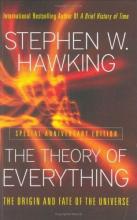Theory Of Everything

Author
Genre
Subgenre
Language
English
Producer
Year
1996
Rating
Stephen Hawking is widely believed to be one of the world's greatest minds, a brilliant theoretical physicist whose work helped reconfigure models of the universe and define what's in it. Imagine sitting in a room listening to Hawking discuss these achievements and place them in historical context; it would be like hearing Christopher Columbus on the New World.
Hawking presents a series of seven lectures - covering everything from big bang to black holes to string theory - that capture not only the brilliance of Hawking's mind but his characteristic wit as well. Of his research on black holes, which absorbed him for more than a decade, he says, 'It might seem a bit like looking for a black cat in a coal cellar.'
Hawking begins with a history of ideas about the universe, from Aristotle's determination that the Earth is round to Hubble's discovery, more than 2,000 years later, that the universe is expanding. Using that as a launching pad, he explores the reaches of modern physics, including theories on the origin of the universe (e.g., the Big Bang), the nature of black holes, and space-time. Finally, he poses the questions left unanswered by modern physics, especially how to combine all the partial theories into a 'unified theory of everything.' 'If we find the answer to that,' he claims, 'it would be the ultimate triumph of human reason.'
A great popularizer of science as well as a brilliant scientist, Hawking believes that advances in theoretical science should be 'understandable in broad principle by everyone, not just a few scientists.' In this book, he offers a fascinating voyage of discovery about the cosmos and our place in it. It is a book for anyone who has ever gazed at the night sky and wondered what was up there and how it came to be.
Hawking presents a series of seven lectures - covering everything from big bang to black holes to string theory - that capture not only the brilliance of Hawking's mind but his characteristic wit as well. Of his research on black holes, which absorbed him for more than a decade, he says, 'It might seem a bit like looking for a black cat in a coal cellar.'
Hawking begins with a history of ideas about the universe, from Aristotle's determination that the Earth is round to Hubble's discovery, more than 2,000 years later, that the universe is expanding. Using that as a launching pad, he explores the reaches of modern physics, including theories on the origin of the universe (e.g., the Big Bang), the nature of black holes, and space-time. Finally, he poses the questions left unanswered by modern physics, especially how to combine all the partial theories into a 'unified theory of everything.' 'If we find the answer to that,' he claims, 'it would be the ultimate triumph of human reason.'
A great popularizer of science as well as a brilliant scientist, Hawking believes that advances in theoretical science should be 'understandable in broad principle by everyone, not just a few scientists.' In this book, he offers a fascinating voyage of discovery about the cosmos and our place in it. It is a book for anyone who has ever gazed at the night sky and wondered what was up there and how it came to be.
Related Content
| Title | Content type | Rating | |
|---|---|---|---|
| |
Space And Time Warps | e-Book | |
| |
The Nature Of Space And Time | e-Book | |
| |
A Brief History Of Time (1) | e-Book |
 bookz 'n' thingz
bookz 'n' thingz